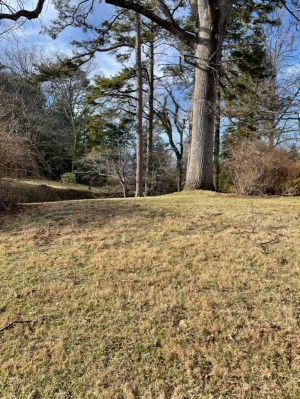

There is a tiny yellow crocus in this picture left of the big tree, taken January 21.
I suffered needlessly recently all because I was afraid of what others might think of me. I thought I was long past that kind of suffering and well able to speak up for myself and ask for help.
Apparently, I’m not.
I was donating platelets for the first time. It’s a process that takes about two hours sitting in a chair with a needle in each elbow. Blood is taken out of your body, platelets removed, and then recirculated back into your body. The blood going back in has cooled quite a bit, thus causing shivers. I was too timid to ask for an extra blanket. All the nurses and technicians were so busy, rushing here and there. I suffered through more besides being cold—pain, numbness, dizziness. I didn’t want to come off like a nagging prima donna, so I didn’t speak up right away.
While it may have been true that they ought to have been more attentive, it is equally true that I didn’t take care of myself either. I allowed myself to suffer to the point of unbearableness and accumulated a well of resentment while doing so, hoping someone would notice my suffering and come to my rescue without my having to ask for help.

I am thankful for these painful lessons because they bring these old beliefs to the surface so that I can become aware of them and humbly ask God to remove them.
I have spent my life waiting for others to pay attention to me, to take care of me, to notice when I am vulnerable and need care. I expected my mother to take care of me when I was little and as a teenager. When I asked for help, she gave it resentfully, or gave such little assistance as to be scandalous. Like when I was homeless in California at age sixteen. I finally called her for help, fearful she wouldn’t care and tell me it was my own fault. I got into this mess myself, I could get out of it. She didn’t say those things. No, she had been worried. She sent me a plane ticket via general delivery at a post office, but not enough money for a motel, food, or transportation to the airport.
In hindsight, I believe she should have given me those things and more–called the cops, called in social services, come out to get me herself. But back then I thought the help she gave me was sufficient and that I needed to suffer. I ended up in a dangerous and painful situation in the days it took me to get to the airport in time for my flight. I didn’t know how to take care of myself. I knew what I wanted but didn’t think I had the right to ask for it.
The platelet donation was the same dynamic on a different level. I knew what I wanted but was afraid to ask for it.
I am thankful for these painful lessons because they bring these old beliefs to the surface so that I can become aware of them and humbly ask God to remove them. But that also means that I must stand up for myself. I must take care of myself and stop waiting for Mom or anyone else I’ve substituted in her place to take care of me.
These lessons are uncomfortable and painful, but I’m worth the trouble of asking for help when I need it.

